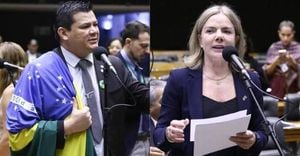Renowned filmmaker Robert Guédiguian is set to return to the big screen with his latest work, 'La Pie Voleuse', scheduled for release on January 29, 2025. This film not only marks his 24th feature but also revisits the familiar territory of his origins, as it is set largely in L'Estaque, Marseille, the very neighborhood where he was born.
'La Pie Voleuse', which translates to 'The Magpie Thief', revolves around Maria, played by the talented Ariane Ascaride. Maria is not your typical protagonist; she is depicted as an aide to the elderly, struggling to make ends meet amid her precarious circumstances. The narrative mixes elements of drama and warmth as it candidly examines issues of economic disparity through Maria's eyes.
Maria's life is complicated by her husband Bruno (Gérard Meylan), who is characterized as a habitual gambler, often draining their finances for his pursuits. To support her family and fund her grandson’s piano lessons, Maria resorts to petty thefts—subtly pilfering money from those she assists. It’s suggested she is somewhat oblivious to the gravity of her actions, rationalizing them as her means of survival. This moral ambiguity sets the stage for the film’s exploration of ethics and empathy.
Guédiguian, who co-wrote the screenplay with Serge Valletti, crafted 'La Pie Voleuse' as a modern fable. Combining music and storytelling, the film opens with the triumphant notes of Rossini's opera, setting a poignant tone for the emotional turbulence to follow.
Interestingly, the delicate balance of Maria's everyday life is disrupted when her minor transgressions lead to serious consequences. A complaint of abuse of trust becomes the catalyst for unexpected developments, driving the narrative from social commentary to suspenseful drama. It’s within this framework of tension and complexity—between generations and social classes—that Guédiguian invites the audience to reflect on relationships and human vulnerabilities.
'The Poor People'—a phrase drawn from Hugo’s poetry—echoes throughout the film as it grapples with themes of loneliness and the quest for dignity. The disparity between Maria’s economic struggles and her clients' fortunes becomes increasingly pronounced, emphasizing the philosophical underpinnings of their shared humanity.
Maria's relationships with the elderly she assists are colored with affection; she is their lifeline, and they, her support system. It’s this mutual dependency, paired with Maria’s frequent infractions, which adds nuance and emotional depth to the narrative. Her actions are both desperate and relatable, creating sympathy for her plight even as they lead her toward darker paths.
One standout element of 'La Pie Voleuse' is how it beautifully merges sound with sentiment. The score, composed by Michel Petrossian, works hand-in-hand with the film’s visual storytelling, enhancing the viewer’s connection to the characters’ emotions. Guédiguian has noted how this rhythm of music allows audiences to bear witness to the subtleties of affection and the transformative power of love.
Viewers can expect both humor and passion interspersed within moments of heartbreaking humanity. The film does not shy away from the raw realities of life but instead presents them with grace and poignancy. It invites us to ponder whether one can truly be 'just' when caught between love and social injustice.
With 'La Pie Voleuse', Guédiguian reaffirms his stance as a chronicler of social realities, weaving tales of injustice yet laced with hope. The film’s storyline resonates deeply within the contemporary socio-economic climate of France, particularly as it hints at the struggles faced by the working class. It’s this social realism combined with the specificity of his characters’ stories which has defined Guédiguian’s oeuvre over the decades.
Critics have already praised Guédiguian for his unique ability to depict the intersection of personal narratives and societal themes compellingly. His works often reflect the tough moral choices faced by individuals, making 'La Pie Voleuse' both timely and timeless. Commenting on the film, Guédiguian was quoted saying, "Nous savons tous qu'il y a un film à trouver et nous le cherchons ensemble," emphasizing his collaborative approach to filmmaking.
'La Pie Voleuse' is not merely about Maria's thefts—it's about the collective struggles and triumphs of individuals like her. Through humor, drama, and music, the film encapsulates the essence of community and its power to uplift, even when circumstances are grim.
When 'La Pie Voleuse' reaches theaters, it promises to be more than just entertainment; it will serve as a mirror reflecting the social dynamics of our time, inviting viewers to empathize with the struggles of others. The film is bound to resonate with many, making it yet another indispensable addition to Guédiguian's body of work, reinforcing his status as one of contemporary cinema's most poignant voices.



